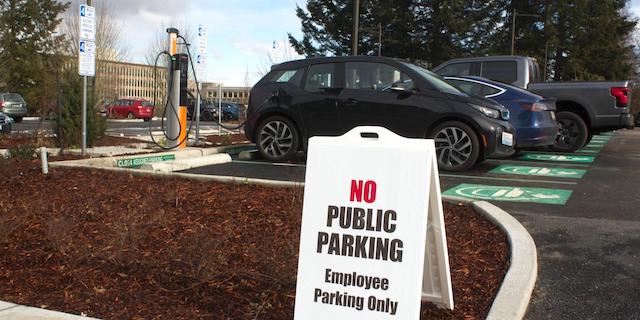Private Treaty February 2025
Pacific Cattle Angus, Sim-Angus, and Simmental range-raised production fall bulls available by PRIVATE TREATY FEBRUARY 2025 Carl Wisse • carl@pacificcattle.com www.pacificcattle.com • 509-539-6850 • Eltopia, WA
Published 9:51 am Monday, February 10, 2025

OLYMPIA — Washington legislators are considering toughening the state’s clean-fuel standard by forcing suppliers of conventional fuels to buy more low-carbon fuel credits.
If legislators pass House Bill 1409, motorists will pay more for gasoline and diesel, Western States Petroleum Association Chief Operating Officer Jody Muller said at a recent hearing.
“Increasing program stringency does affect fuel affordability. Ultimately, policy makers should own that decision,” she said.
HB 1409 would rework a program lawmakers adopted in 2021 to gradually reduce carbon emissions from transportation fuels by 20% by 2038. Petroleum fuel suppliers must buy credits from suppliers of alternative fuels, such as ethanol and renewable diesel.
Credits sold for $106 when the program was new, but the price has been sinking since, according to Department of Ecology records. Credits sold for $22.93 in January, Ecology reported.
HB 1409 seeks to increase the price of credits by moving up the 20% emissions-reduction to 2034, forcing conventional fuel suppliers to buy more credits over the next several years.
With credit prices low, the program has had only a small effect on fuel prices, adding less than a penny a gallon to gasoline and diesel in 2023, according to Ecology.
Ecology has not tried to predict how speeding-up the clean-fuel program would affect pump prices. Washington has the third-highest gasoline and diesel prices in the U.S., according to AAA.
Environmental groups, alternative fuel producers and some electric utilities support the bill. Utilities get credits for supplying electricity to charge electric vehicles.
Testifying for HB 1409, Michael Breisch of Seattle City Light told legislators the credits are a “critical source of revenue to invest in clean transportation.”
Washington Policy Center vice president for research Todd Myers said in an interview the clean-fuel program duplicates the emission reductions mandated by cap-and-trade.
“The only thing this bill does is raise the price of gas and funnel money to credit producers and local governments,” he said.
HB 1409 also would strip from the clean-fuel program a provision that caps the emissions reduction from transportation fuels at 10% unless in-state production of biofuels increases.
Bill sponsor Rep. Joe Fitzgibbon, D-Burien, said he likes that goal, but keeping it as a requirement may stop the clean-fuel program if crop prices are higher for food than fuel.
Farm lobbyist Ben Buchholz asked lawmakers to retain the provision. “For farmers, the current law is a promise,” he said.